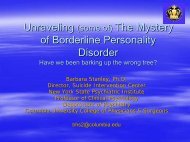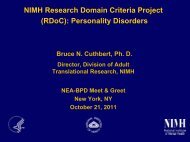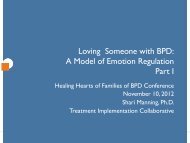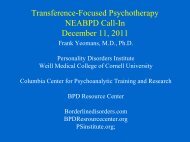A BPD Brief - Borderline Personality Disorder
A BPD Brief - Borderline Personality Disorder
A BPD Brief - Borderline Personality Disorder
You also want an ePaper? Increase the reach of your titles
YUMPU automatically turns print PDFs into web optimized ePapers that Google loves.
___________________________________________________________________________ 6The Origins of <strong>BPD</strong><strong>Borderline</strong> <strong>Personality</strong> <strong>Disorder</strong>, like all other major psychiatric disorders, is caused by acomplex combination of genetic, social, and psychological factors. All modern theories nowagree that multiple causes must interact with one another in order for the disorder to becomemanifest.There are, however, known risk factors for the development of <strong>BPD</strong>. The risk factors includethose present at birth, called temperaments; experiences occurring in childhood; andsustained environmental influences.A. Inborn Biogenetic TemperamentsThe degree in which <strong>Borderline</strong> <strong>Personality</strong> <strong>Disorder</strong> is caused by inborn factors, called the“level of heritability” is estimated to be 52-68%. This is about the same as for bipolar disorder.What is believed to be inherited are the biogenetic dispositions, i.e., temperaments, (or, asnoted above, phenotypes), for Affective Dysregulation, Impulsivity, and InterpersonalHypersensitivity. For children with these inborn dispositions, environmental factors can thensignificantly delimit or exacerbate them into adult <strong>BPD</strong>. But, in addition, some more <strong>BPD</strong>specificdisposition is inherited that glues these phenotypes together.Many studies have shown that disorders of emotional regulation, interpersonalhypersensitivity, or impulsivity are disproportionately higher in relatives of <strong>BPD</strong> patients.The affect/emotion temperament predisposes individuals to being easily upset, angry,depressed, and anxious. The impulsivity temperament predisposes individuals to act withoutthinking of the consequences, or even to purposefully seek dangerous activities. Theinterpersonal hypersensitivity temperament probably starts with extreme sensitivity toseparations or rejections. Another theory has proposed that patients with <strong>BPD</strong> are born withexcessive aggression which is genetically based (as opposed to being environmental inorigin). A child born with a cheerful, warm, placid or passive temperament would be unlikely todevelop <strong>BPD</strong>.Normal neurological function is needed for such complex tasks as impulse control, regulation ofemotions, and perception of social cues. Studies of <strong>BPD</strong> patients have identified an increasedincidence of neurological dysfunctions, often subtle that are discernible on close examination. Thelargest portion of the brain is the cerebrum, where information is interpreted coming in from thesenses, and from which conscious thoughts and planned behavior emanate. Preliminary studieshave found that individuals with <strong>BPD</strong> have a diminished response to emotionally intense stimulationin the planning/organizing areas of the cerebrum and that the lower levels of brain activity maypromote impulsive behavior. The limbic system, located at the center of the brain, is sometimesthought of as “the emotional brain”, and consists of the amygdala, hippocampus, thalamus,hypothalamus and parts of the brain stem. There is evidence that in response to emotional arousal,the amygdale is particularly active in persons with <strong>BPD</strong>.B. Psychological FactorsLike most other mental illnesses, <strong>Borderline</strong> <strong>Personality</strong> <strong>Disorder</strong> does not appear to originate duringa specific, discrete phase of development. Recent studies have suggested that pre-borderlinechildren fail to learn accurate ways to identify feelings or to accurately attribute motives inthemselves and others (often called failures of “mentalization”). Such children fail to develop basicmental capacities that constitute a stable sense of self and make themselves or othersunderstandable or predictable. One important theory has emphasized the critical role of an____________________________________________________________________________A <strong>BPD</strong> <strong>Brief</strong>: Revised 2011
















